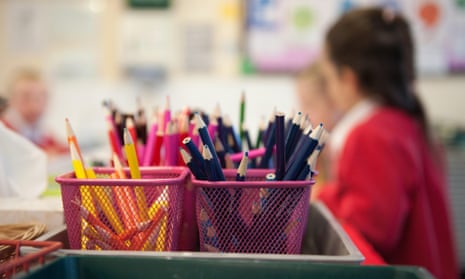One in five teachers are spending their own money on classroom supplies, while nearly half say they buy food, clothes and even soap for poor pupils, according to a report charting the effects of austerity on schools.
Among the more than 4,300 teachers who responded to the NASUWT education union, 20% said they paid for resources such as paper or books used in their lessons at least once a week, with half of those saying they did so “several times a week”.
The responses show an education system struggling to function without basic supplies, with one teacher stating: “We soon will be unable to teach unless we fund it ourselves.”
At the same time, 45% of the teachers told the union they had also spent their own money buying basic necessities for pupils over the past year, with most paying for food, while 29% purchased toiletries and 23% said they bought clothing or shoes.
“Teachers once again are being left to pick up the pieces of failed education, social and economic policies,” said Chris Keates, NASUWT’s general secretary, as the union prepared for the start of its annual conference.
The details supplied by teachers reveal a harrowing array of issues involving poverty and the effects of austerity inside and outside the school gates.
Several teachers reported regularly paying for breakfast for pupils who had eaten nothing since the previous day’s school lunch, with some buying winter coats for those without.
“In the community I serve, there is high poverty and many students don’t have the basics: shampoo, toothpaste and shower gel. Many teachers in the school that I work in provide as much as they can for students,” said one teacher.
Another reported: “I’ve always had supplies for those who don’t; I was brought up on benefits so I know what it’s like. However, it used to be just one or two children in a class of 30. I now have five in a class of 20.”
One teacher estimated that she had voluntarily spent £5,000 on classroom supplies in recent years, including pencils, scissors and glue: “Schools are increasingly funding only basic consumables and if I want my lessons to go smoothly and for behaviour to be good, I need to purchase those things that are missing or run out.”
Another reported: “All departmental budgets have been frozen and all the stock rooms are empty. Basic resources are rationed out at the beginning of each term and once they are gone there is no more unless you purchase them yourself.”
Analysis by the Institute for Fiscal Studies found that spending per pupil in England’s state schools fell by 8% in real terms between 2009-10 and 2017-18.
But the Department for Education (DfE) maintained that spending on schools in England was at record levels, with an additional £1.3bn going into core schools funding this year and in 2019-20.
“We recognise the budgeting challenges schools face and have introduced a wide range of practical support to help schools and head teachers, to help schools make the most of every pound on non-staff costs,” a DfE spokesperson said.
Nadhim Zahawi, the minister for children and families, said tackling disadvantage was a priority for the government. “The secretary of state [Damian Hinds] has made clear that as we approach the next spending review, he will back headteachers to have the resources they need to deliver a world class education,” Zahawi said.
But Angela Rayner, Labour’s shadow education secretary, said: “It cannot be right that teachers are having to reach into their own pockets and schools are sending begging letters to parents, just to make ends meet.
“The Tories made a political choice to cut school budgets for the first time in a generation, and it is a generation of children who are paying the price.”









